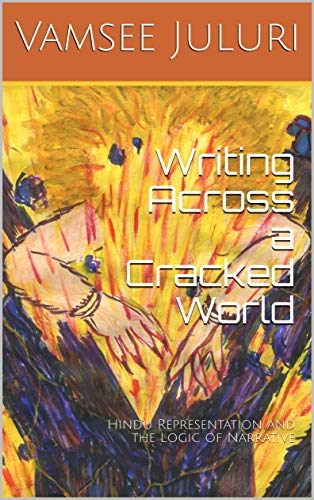
When I first read Rearming Hinduism by Prof. Vamsee Juluri, it had made a deep impression on me. What I liked most was the personalised narration by the author in the second half of the book. It resonated with me so much that almost immediately after finishing it, I had picked up his Hinduism and its Culture Wars and then Nine Nights in Kishkindha: A Memoir about Hanuman, Hampi and My Father. Of the three, the last mentioned is my favourite, because I believe that one can’t write about a topic like Hindu dharma without having first hand experience of it, of having lived it–which the author has.
But though I loved these books and many of his articles, it was only when I read Writing Across a Cracked World, that something clicked in the writing part of my brain. Reading the book has helped me see my own place in what Prof. Juluri calls the Hindu Movement, even if only vaguely. When I finished reading it, I pinged Dagny Sol and told her about the book. So intrigued had she been, that she bought it even as we were chatting! We were like two girls gushing over the book for the next few weeks.
I wanted a review of the book for my blog, but somehow it never occurred to me to do it myself. I felt that only a writer, who uses the tools of writing and editing with the greatest skill could do justice to this primer of quality-writing-with-a-purpose. It was natural then, for me to turn to my dear friend Dagny, whose book reviews are superbly written. I was thrilled when she readily agreed to review the book for me.
Over to Dagny…..
Book Review: Writing Across A Cracked World by Vamsee Juluri

Vamsee Juluri states his purpose plainly in the Introduction. It is to arm the writers and influencers of tomorrow with the conviction and language they will need to challenge the biased and false Hinduphobic narrative trotted out globally. It is to equip them to speak their truth with unapologetic passion and ruthless objectivity. He states it concisely:
If your goal is to strengthen the emerging Hindu narrative through any form of writing—books, novels, articles, blog posts, or even tweets—this book will help you.
Like a true mentor and teacher, he accomplishes his purpose by first analysing and dissecting the arena in which the writer of tomorrow would be functioning. He describes not only the pitfalls and quagmires; he also shows the lifelines that a writer (aka warrior) may use to navigate this often treacherous terrain.
Then he gives you the tools—the conviction, language and perspective—with which the writer would engage with those who produce the biased narrative. He says:
The premise of this book is that it is possible to remain true to your own convictions, and at the same time communicate fearlessly and credibly with a wider audience, including those who have not yet come to recognize the deceptions and dangers of unchecked Hinduphobia.
Like many others, the idea of engaging with those who have bought deeply into the anti-Hindu discourse was uncomfortable to me. I protected my fatheaded attitude by ensconcing it in unforgivable superciliousness.
Why bother? I thought. Let others say what they will, why should I bother engaging with them? My truth does not need their recognition in order to become valid. Someday they will know the truth because the truth can never the hidden for long. My job is to ignore them and let Shiva do His job of bopping them on the head with a chair. I’ll wait meanwhile.
There was a lot more in the same vein. You get the drift.
I’m not saying I’m completely reformed and ready to roll up my sleeves before jumping enthusiastically into the mud-trough. With time I’m sure I would get there—one step at a time. At present, I have only understood the dire need for it. Getting an aircraft to the critical momentum where it can softly drop the earth and rise uses up 70% of the aircraft’s fuel and power. I’m about to be airborne I think.
After reading the book I realized why the engagement was essential—no matter on how large or small a scale. If I can only manage on a small scale, then that’s what I must do. While this civilizational battle comes to a death-grip with those that would destroy it, I will not sit on my hands and pretend the elephant isn’t squatting in my living room—or that he would walk off by himself.
Hinduism—its wisdom, practices and ethos—is reeling under the most severe attack it has ever been. It is one thing to be criticized for being evil, quite another to be chastised for being good. Penalizing and hating ‘the good’ for being ‘the good’ was never a concept I have agreed with. In this particular application, however, the concept is an abomination—and the mark of such rank stupidity as to border on evil.
This book opened my eyes to many things. What I’m most grateful to the author for, is to have shown me that my civilization and culture were being put on a stand for being the most wonderful system of thought there ever was in this cracked world of ours. Vamsee Juluri taught me how to navigate this broken world while holding my flag high—not because it is my flag, but because it deserves to be held aloft. Why? Because it is GOOD.
My words cannot hope to encompass my gratitude to Vamsee Juluri for being the source of the words that spoke to my heart.
As I read, I was compelled to stop and make notes because I had to let the overflow out or I’d have burst. This is what I remember typing on my Kindle, an onerous task I always avoid because I detest typing on a bit of glass.
Why must we narrate our own story and stand up to be counted? I wrote:
- We must do it because it is the truth and truth must prevail. I owe it to my self-respect and to my integrity that I speak my truth. If truth needs to be given a leg up in order to prevail, I will do it.
- It must be done because if we don’t set the record straight we might get wiped out. Our way of life and culture, will cease to exist. That is a real threat and it is time to stop being an ostrich.
- To state our truth for posterity. At this point, no one can say for sure whether humanity would open its eyes or continue to stumble blindly on to end up destroying something they should have devoted all their energies to preserve and celebrate. Recording our stories could influence the current fence squatters… and we may survive after all. If not, these stories may be of use to future generations as they begin to rebuild the world.
Vamsee Juluri brought out his true treasures when he brought out his tool-box of language. He unpacked the tool-box with a master’s skill and certitude. He identified the vocabulary of the current narrative-setters. This was important because you cannot expect to beat someone at their game without learning the rules of the game.

He demonstrated—often using his own articles—how their arguments may be slain, in a precise, logical and coherent way—without getting hot under the collar (and sounding like an escaped loony-bin inmate). The last is vital. It shows that you are in perfect control because you know what you are talking about. It projects your argument as a self-evident truth and that creates a powerful impact. This is what your readers would feel—he promises to you—if only you would learn the rules of effective engagement from him! Here is how he says it:
It’s hard to pinpoint what defines a voice. You are after all reading, and not listening, And yet, in the flow of words and silences, in the warmth of meaning, you are listening. You may picture this task of listening as coming from a person, a body, or just from somewhere out there; or better still, somewhere deep inside you. The best writing feels that way, like an agreement being teased out from your heart to your plane of language. The author is both there, and not there. Either way, he or she, is your friend.
After having read all I had until that point, I was in the best frame of mind to appreciate the dexterity and finesse of his words. They made a profound impact on me. The writer in me gulped in huge mouthful while the editor in me furiously scribbled mental notes as if my life depended on it. He is a master communicator, there’s no doubt about it.
He believes—and I agree with him—that language is the most effective weapon we have in this battle. He shared many of his own articles with an almost sentence by sentence analysis of why he used the words he did, why he structured his sentences as he did. For a lover of language like me, it was a most instructive study. To demonstrate, here is a nugget:
Imagine… a book called The Women, written by a man who is supposed to be an expert on women; a book called The Poor, written by a rich man who has read a few books on poverty written by other rich people; A book called The Gays, written by a heterosexual who insists he loves his subjects even if they say he is quite homophobic. Now Imagine, a book called The Hindus. [written by non-Hindus—who have no clue what Hinduism is.]
As if I was not overwhelmed already, he threw down something that shook me. With amazing perspicuity, he wondered aloud why writers shy away from calling themselves writers. Gently, he told the reader that if they wrote often—blog-posts, articles or even long social media posts—they were writers and must call themselves so. To me, it seemed as if he could look into my heart. I was reminded of the months of struggle I went through before I finally garnered up the courage to define myself as a writer in my introduction on my website and social media accounts. I had never shared this particular struggle even with my children!
Anyone who wishes to learn how to write in a commanding, authoritative way, cannot do better than to read this book. Language nuance and expression; flair and style that border on flamboyantly audacious; integrity to ideas that politely but boldly calls a spade a spade—you would polish them all. At the very least, almost as an afterthought, this book is the perfect manual to being an influential writer.
Do I still need to say I loved the book?
About Vamsee Juluri:
Vamsee Juluri is a writer, novelist and a Professor of Media Studies at the University of San Francisco, where he teaches several courses focused on the study of media narratives. His books include the best-selling Rearming Hinduism: Nature, Hindophobia and the Return of Indian Intelligence (Westland, 2015), Bollywood Nation: India through its Cinema (Penguin India, 2013), The Mythologist: A Novel (Penguin India, 2010) and Saraswathi’s Intelligence: Book I of Kishkindha Chronicles, an ongoing series,(Westland, 2016). His other books include Becoming a Global Audience: Longing and Belonging in Indian Music Television (Peter Lang, 2003/Orient Longman, 2005), Hinduism and its Cultural Wars and Nine Days in Kishkindha–A Memoir About, Hanuman, Hampi and My Father. He is presently writing a book on American media stereotypes of Hinduism.
His writing has been published in The Huffington Post, San Francisco Chronicle, Swarajya, Times of India, Indian Express, The Hindu, Foreign Affairs, DailyO, Pragyata, India Facts, and other publications.
Dagny Sol is a Freelance Book Editor, Writer, Blogger, Life Coach, Entrepreneur and more. Indeed, she is a woman who wears many hats in many styles and carries them all with great aplomb. Her blog Serenely Rapt is a treasure trove where one can dive in endlessly to bring out pearls of wisdom, wit and fancy. Most of all, she is a great friend and philosopher to me.
Pic courtesy: swarajyamag.com






A good read and the review has ignited an urge to read this one. Actually, so much is now being churned out on Hinduism by some not even having the faintest idea how much depth is there and barely they just touch the surface.
LikeLiked by 1 person
I would love to know your thoughts when you’ve read the book. Do share what strikes you the most when you do read it. I am pleased the review urges you to read the book! Thanks!
LikeLike
O Zephyr, you totally deserve that place 🙂 I am ordering Nine nights soon….Suhas has also been meaning to read it. I am also so happy that Dagny agreed to review this book! And what a fabulous job she has done with this.
LikeLiked by 1 person
You are just biased, but I love the bias 🙂 This book begged to be reviewed by Dagny and so I asked her. I want to read your posts on Hampi again. Was it on the Beauty blog or Matriwords?
LikeLiked by 1 person
Suhas was going to work on those Hampi posts, but he stopped after the first 2 parts….these are on the matriwords blog. Let’s see when we can get more posts in that series.
LikeLike
After today’s news about the desecration of the Brindavana of Vyasa tirtha, he should start it soon. It is so painful to read about it all. Especially since it has been just recently that I read Juluri’s Nine Nights in Kishkindha, where he has described each of these Brindavanas in such loving detail. I will look up the Hampi posts on Matriwords.
LikeLiked by 1 person
Thank you dearest Beloo! When you appreciate my writing, I know I have done well. ❤
LikeLike
[…] read the rest of the review, trudge along to The Cybernag: Book Review: Writing Across A Cracked World by Vamsee Juluri and take a look. While there, you might do yourself a favour and read some of the other excellent […]
LikeLike
Wow! Getting all three wonderful writers together in one blog post. This is great! I agree wholeheartedly with your review, Dagny, it is a great book on writing – writing truthfully, strongly, with integrity, courage and dignity. The clarity with which Vamsee Juluri makes his arguments is amazing. I have yet to read his Nine Days in Kishkindha, will pick it up soon! Rearming Hinduism i of course a great read also. Thanks for writing this review, Dagny, and Zephyr for publishing it on your blog 🙂
LikeLiked by 1 person
I’m so pleased you read this Beloo! Rearming Hinduism was indeed an excellent book too. Vamsee Juluri is a master communicator. His rather muted and reasonable writing style is surprisingly powerful. But he knows how to dismantle false arguments without raising his voice–so to speak.
There is so much to learn from him.
LikeLike
You are right, Dagny. Vamsee Juluri knows how to make a point effectively and forcefully with seeming effortlessness. If only I could learn a fraction of what he teaches in the book, I would be way, way a better writer. Thank you so much for this wonderful review!
LikeLiked by 1 person
I was so deeply impressed by the book that I couldn’t think beyond Dagny to do the review but was a little unsure because of her busy schedule. When she said ‘yes’ I was over the moon and just look at the review! If the author has written an exemplary handbook for writers, she has brought out every aspect in such precise and crisp language. She is as much a master of words as Vamsee Juluri is! Thank you Dags! And thank you Beloo for bracketing me with both of them, though I know I don’t deserve that place!
Just finished Nine Nights in Kishkindha after re-reading passages umpteen times to savour everything about the writing completely. You will like it.
LikeLiked by 1 person
You’re too humble by half Zephyr! And you’re as biased as Beloo is! And I love it! 😀
LikeLike